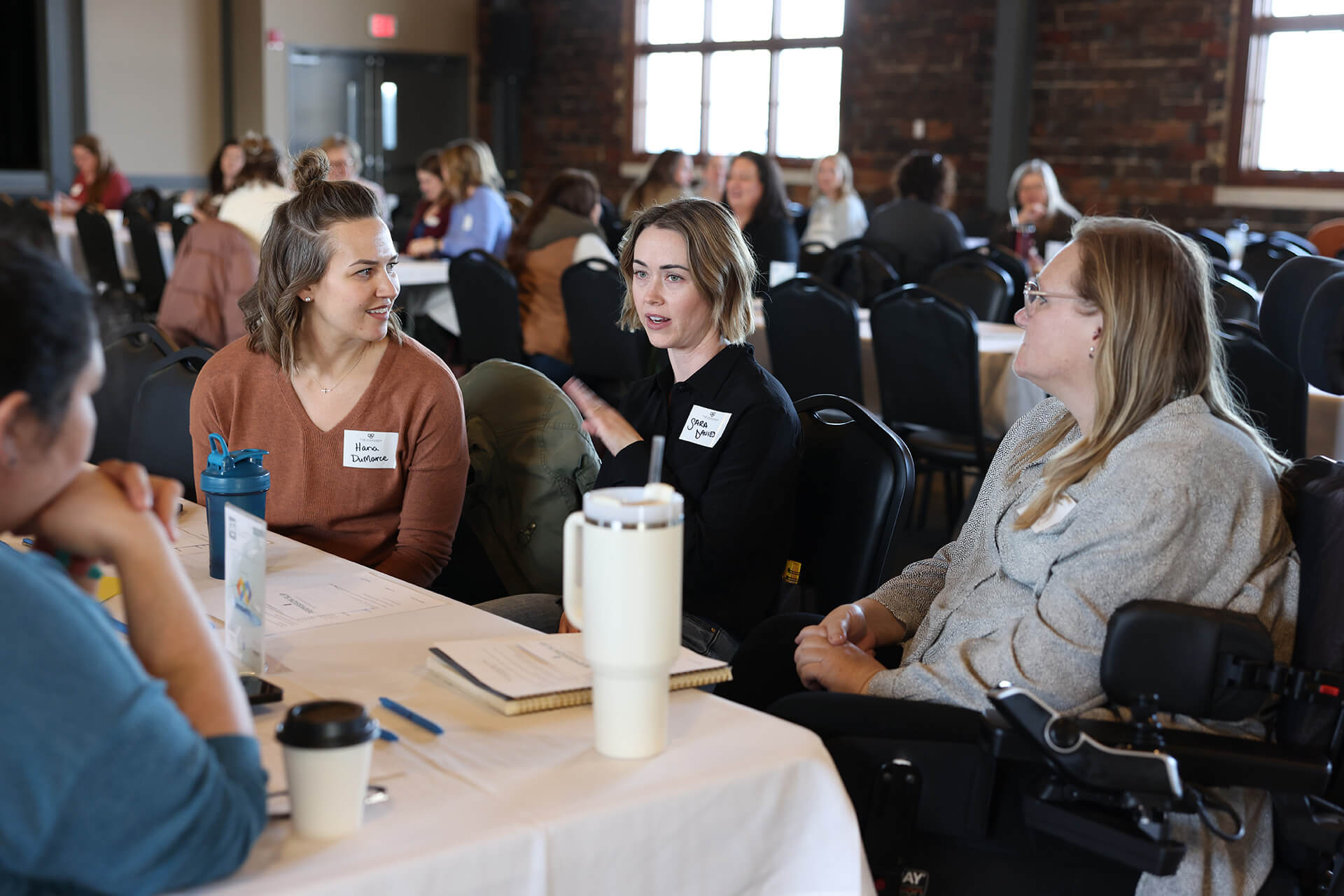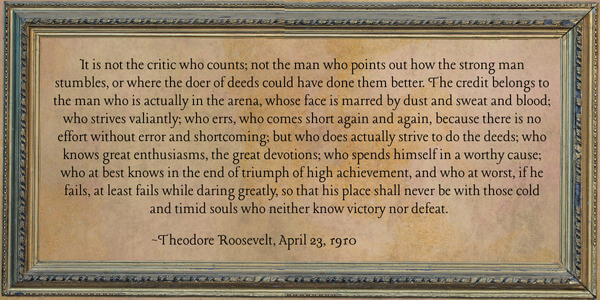03.27.25
The Arena: Where Do You Stand?
By Sadie Rudolph, Vice President of Strategic Communication, The Chamber

Attendees discussing the framework from the January Women Connect session.
Leadership is often described as stepping into the arena—an unpredictable space where courage is tested, where challenges are faced head-on and where one's character is defined. The arena, metaphorically, represents the challenging, often messy world where leaders are made. It’s where we take risks, make mistakes and grow—sometimes succeeding, sometimes failing. Yet, it is in the arena that true leadership reveals itself.
At January’s Women Connect, Dare to Lead certified facilitator and NDSU professor Jill Nelson, Ph.D., invited attendees to consider the profound impact of Theodore Roosevelt’s speech “The Man in the Arena.” An excerpt from his 1910 speech, “Citizenship in a Republic,” captures the essence of what it means to show up and lead despite the odds. Roosevelt’s words still resonate today:

Jill challenged attendees to reflect on their own leadership styles and to think about where they sit when they are in the arena. It’s easy to point out others’ shortcomings, but it’s far more difficult to step into the fray ourselves, to take the hits and to keep moving forward. Where we position ourselves—whether we actively participate in the process or remain passive observers—defines the level of impact we can have on others and on the world around us.
Jill described four types of seats in the arena, each symbolizing different approaches to leadership and engagement:
The Cheap Seats
The Cheap Seats are reserved for the critics—those who stand on the sidelines and judge others. They are quick to point out mistakes and failures but seldom take action themselves. This seat is filled with negativity, complaints and blame, but the occupants rarely, if ever, step into the arena themselves. The Cheap Seats may offer a comfortable vantage point, but they do nothing to contribute to the action or to solving the problems at hand. Those in the Cheap Seats often hold back from trying because of fear of failure, preferring to criticize from the comfort of distance rather than participate in the struggle of striving for success.
The Season Ticket Holders
The Season Ticket Holders occupy seats filled with comparison, scarcity and shame. These individuals often believe that in order to win, someone else must lose. They measure their worth by how they compare to others and may feel like they are “not enough.” In this space, competition can feel endless, and it often fosters an environment of burnout and frustration. Instead of lifting one another up, Season Ticket Holders focus on how others are succeeding or failing, leaving little room for personal growth or collaboration. These seats are dangerous because they reinforce an unhealthy mindset where success is measured by competition, not contribution.
The Box Seats
The Box Seats are reserved for those who have the power to shape the arena and the rules of engagement. These individuals often have significant influence and may use their position to reinforce existing systems and structures. While they may have built the arena, the Box Seats can sometimes perpetuate inequalities and barriers to success for others. People in these seats might be well-placed, but they often fail to understand or acknowledge the struggles of those in the other seats. The Box Seats may seem glamorous and prestigious, but they can also be isolating and disconnected from the reality of the arena’s challenges.
The Support Section
Perhaps the most vital seats in the arena are the Support Section. These seats are where empathy, compassion and encouragement live. Here, we find the true allies—the individuals who lead with authenticity, who show up with grace and who lift others up. The Support Section is not about competition or winning—it’s about helping everyone to succeed by fostering an environment of collaboration and self-compassion. Leaders in this section understand that the arena is hard, and they help others navigate the obstacles by offering a hand, a kind word and a reminder that we are all in this together. The Support Section is where resilience is nurtured, and leadership is defined by the ability to help others reach their full potential.
Where Do You Sit?
As you reflect on these different seating styles, it’s important to ask yourself: Where do you sit in the arena? Are you a critic sitting in the Cheap Seats, or are you stepping into the fray, ready to face the challenges ahead? Are you a Season Ticket Holder, measuring your worth by comparison and scarcity, or are you building relationships in the Support Section, where empathy and collaboration thrive?
True leadership is not about avoiding the struggle but about leaning into it with courage, humility and a willingness to grow. It’s about getting into the arena, facing the discomfort and daring to fail—because at least in failing, we learn, we grow and we continue to push forward.
So, as you consider your role in your professional and personal life, remember that leadership is a choice. It’s a decision to get in the arena, to try your best, to support others and to step away from the sidelines. Leadership isn’t about avoiding mistakes; it’s about daring greatly, failing boldly and always striving to do better—knowing that the true credit belongs to those who choose to step into the arena and lead with purpose.
SHARE
More Stories
Upcoming Events
